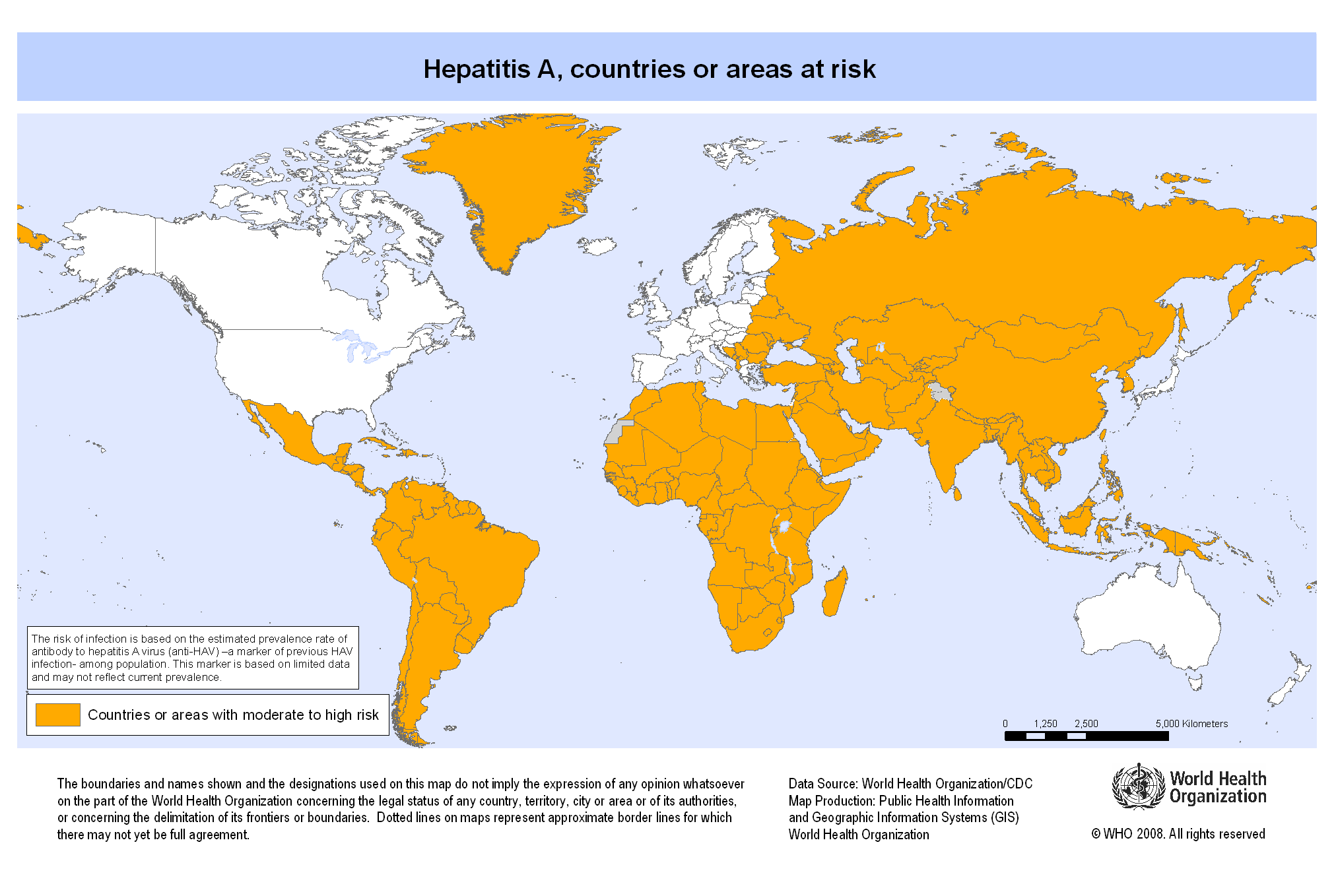Hepatitis A is a virus that causes a liver disease that carries the same name, Hepatitis A. It is highly contagious, and the most likely way to contract this disease is by consuming contaminated food or water. Hepatitis A can also be spread by close contact with somebody who is infected. It is estimated that there are about 1.4 million cases of Hepatitis A worldwide every year. Symptoms of Hepatitis A usually appear a few weeks after one has contracted the virus and include:
- Nausea/Vomiting
- Loss of Appetite
- Dark Urine
- Jaundice
- Fatigue
- Abdominal Pain
- Low-Grade Fever
- Muscle Pain
 |
| As can be seen in the map above, almost all countries are at moderate to high risk of Hepatitis A, with the exception of many 1st world countries. Map provided by WHO. |
Source: World Health Organization (WHO)
Cholera
B. i. Cholera is an infectionous and often fatal bacterial disease of the small intestine, contracted from infected water supplies.
ii. These contaminations cause severe vomiting and diarrhea which therefore can cause these people to become extreemly dehydrated. Ill and dehydrated people in an unsanitary place can cause many deaths due to the lack of fresh water.
iii. Cholera bacterium are found in people's feces, or poop, of those who are infected. Therefore cholera gets into our water by an infected persons poop getting into our drinking water. This causes the people who drink this contaminated water to also get cholera.
iv. Good sanitation and running water can prevent this because feces will be flushed and moved out of the drinking water to be cleaned. This disease usually comes around after a disasted such as earthquakes or floods because the water cleaning systems are destoyed and the feces float around. This disease is not contagouse but can be spread due to the contaminated water through an infected person's feces.
http://kidshealth.org/teen/infections/bacterial_viral/cholera.html
http://www.youtube.com/watch?v=jG1VNSCsP5Q&noredirect=1
E. Coli
Escherichia Coli (abbreviated E. Coli) is a large group of bacteria. While most are harmless, and some essential for healthy intestinal functions, others are pathogenic and can make a person very sick. Some types cause diarrhea, which can extremely dehydrate people, and can cause death. The types that can cause diarrhea can be transmitted through contaminated water or food. There are six pathotypes of E. Coli associated with diarrhea. They are:
- Shiga toxin-producing E. Coli (STEC)
- Enterotoxigenic E. Coli (ETEC)
- Enteropathogenic E. Coli (EPEC)
- Enteroaggregative E. Coli (EAEC)
- Enteroinvasive E. Coli (EIEC)
- Diffusely adherent E. Coli (DAEC)
CDC E. Coli
E. Coli comes from human or animal waste. Whenever it rains, snow melts, or another from of percipitation, E. Coli could be washed into waterways. When these water sources are used for drinking water and the water isn't properly treated, E. Coli could end up in the drinking water.
E. Coli can be treated by using chlorine, UV light, or ozone, all of which kill or inactivate E. Coli. Systems that use surface water are required to disinfect the water for safety.
EPA E. Coli
What really kills people when they contract cholera?
ReplyDeleteDehydration is what really kills these people because as they have severe diarrea and vomiting they lose a lot of water from their bodies causing extreme dehydration. In unsanitary places it is hard to keep someone with cholera hydrated due to the lack of fresh water.
DeleteAre there any cures if you get these diseases?
ReplyDeleteFor Hepatitis A, the only proven treatment is time, because your body will eventually naturally kill and remove the virus.
DeleteCan other types of hepatitis, like B and C, be contracted from drinking contaminated water?
ReplyDeleteReally good question! Hepatitis A is a common biological contaminant in water because it can be spread through fecal matter. The other types of Hepatitis (B or C) are well-known as blood-borne pathogens, but cannot be spread through fecal matter; these diseases essentially require direct contact and cannot be spread through water.
DeleteIf vaccinated for Hepatitis, are you still able to contract the disease through water?
ReplyDeleteAs you may know, vaccines exist for Hepatitis A and B. Just like with any other disease, there still exists a small chance of contracting the disease even with a vaccine. But, luckily, only Hepatitis A is found in contaminated water, and your body will naturally flush the virus out.
DeleteIs ecoli mainly found in waterways of developing countries or can it be commonly found in developed countries like the United States?
ReplyDeleteDoes Cholera originate from places other than feces such as fertilizers and other hazardous wastes that get into our water systems?
ReplyDeleteCan any of these bacteria's/diseases be bad to the point where you have to be hospitalized?
ReplyDelete